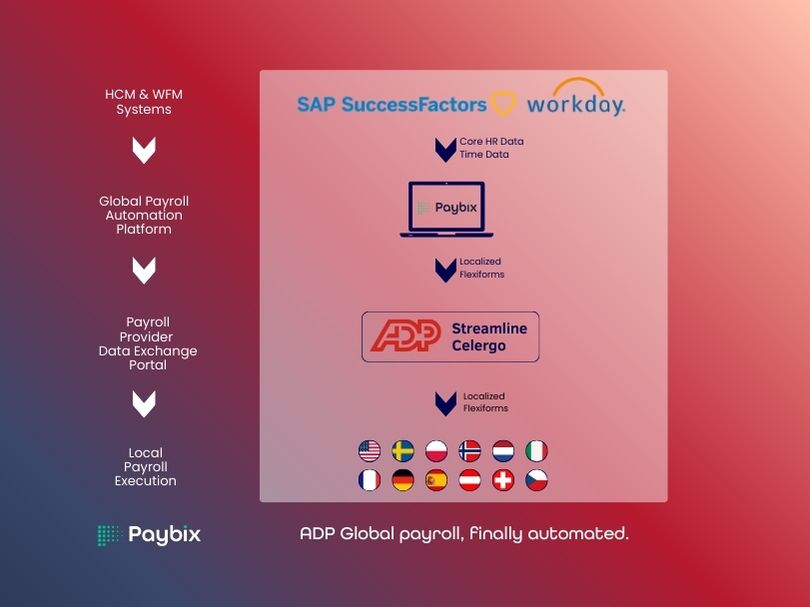Solutions
Payroll in Belgium
Thinking about hiring in Belgium? To stay compliant and keep things running smoothly, you’ll need to understand the local rules around HR, payroll, social security, and taxes. Discover the key information laid out for you below.

HR and labor laws in Belgium
When you’re hiring in Belgium, it’s crucial to understand local labor laws. From contracts and working hours to leave entitlements and dismissal procedures, here’s what you should know about specific laws in Belgium.
Employment contracts
Regulate the rights and obligations of employers and employees in Belgium. Important elements are the probationary period, notice periods and dismissal procedures.
Working hours
In Belgium, the standard full-time workweek is set at 38 hours. Anything beyond that typically counts as overtime, which comes with specific conditions and often higher pay.
Leave policies
As an employer, you're responsible for withholding the right amount of income tax and social security contributions from your employees’ gross wages. These payments go to the government and various social funds. This includes payroll tax, national social security (RSZ), and sometimes sector-specific contributions.
Payroll management
Paying your team right means following the local payroll laws and protecting your business from fines or legal issues. Here are the payroll essentials in Belgium:
Minimum wage
Belgium has a legal minimum wage that’s reviewed and adjusted regularly. On top of that, many sectors have their own minimums set through collective labor agreements (known as “CAOs”), depending on the industry or labor commission.
Wage indexing
To help employees keep up with the cost of living, wages in Belgium are automatically adjusted through an indexation system. The timing and rate of indexation vary by sector. Some do it yearly, others quarterly, and some even monthly.
Social contributions in Belgium
As an employer, you're responsible for withholding the right amount of income tax and social security contributions from your employees’ gross wages. These payments go to the government and various social funds. This includes payroll tax, national social security (RSZ), and sometimes sector-specific contributions.
Social security in Belgium
The social security system in Belgium acts as a safety net for your employees, offering protection in key moments throughout their careers and lives. It’s designed to provide financial support during live events like illness, maternity, unemployment or retirement. Discover how the social security system works in Belgium:
Contributions
Both employers and employees are required to make regular contributions to the national social security system. These payments help fund essential services like healthcare, unemployment benefits, and retirement pensions. The rates are set by the government and vary depending on the type of employment.
Health and disability insurance
If an employee falls ill or becomes temporarily or permanently disabled, Belgium’s social security system offers financial protection to replace lost income. This includes coverage for medical costs and compensation for time off work.
Retirement system
Belgium’s retirement system is made up of multiple layers. The foundation is the statutory (legal) pension, which is based on years worked and average earnings. On top of that, many employees benefit from supplementary pensions, either through employer-sponsored plans or personal savings options.
Workplace protections
Creating a fair and safe workplace matters. These laws help protect your employees in Belgium:
Anti-discrimination
Belgian law strictly prohibits discrimination in the workplace based on gender, race, age, religion, disability, sexual orientation, and other protected characteristics. These rules apply during the entire employment process: from job postings and interviews to promotions and terminations. Employers must provide equal opportunities and take active steps to prevent discriminatory practices.
Collective agreements (CBA)
In many sectors, working conditions are set through collective labor agreements (called “collectieve arbeidsovereenkomsten” or CAOs). These are negotiated between employers (or employer organizations) and trade unions. CAOs often go beyond the legal minimums and define specifics like wages, working hours, vacation entitlements, and notice periods. Once signed, they’re legally binding for all employers and employees within that sector.
Tax regulations in Belgium
Taxes canbe tricky. Understanding how the system works in Belgium, helps you avoid surprises and stay compliant. Here are some tax basics to keep in mind:
Income tax
Belgium uses a progressive income tax system, meaning that employees are taxed athigher rates as their income increases. The tax is withheld directly from employee salaries and paid to the government by the employer. There are multiple tax brackets, and the rates can be relatively high compared to other countries.
Deductions and credits
To reduce the overall tax burden, both individuals and employers may qualify for various deductions and tax benefits. Common examples include deductions for childcare expenses, home energy-saving improvements, and certain professional costs.
Value-added tax (VAT)
VAT is a key part of Belgium’s tax system. The standard rate is 21%, but reduced rates of 6% or 12% apply to specific goods and services, such as basic food items, books, and some energy-related products. Businesses must register for VAT, charge it appropriately on invoices, and regularly file VAT returns.
Paybix helps you managing your payroll in Belgium
Running European payroll, Emea payroll or global payroll takes local knowhow. With Paybix, you’ll get expert support, tailored to each country your business in situated in. Thanks to our unified and digital platform, you gather clear insight in labor costs and cross-country payroll. You benefit from a 30% more efficient payroll process, including global reporting and core HR data management. Hassle-free, user-friendly and easy integrated with local payroll providers in every country including payroll in the Netherlands, Germany, France and a lot more.
To ensurefull compliance with the latest regulations, Paybix consults with local legal partners and payroll providers. Get in touch with our experts. We provide you with accurate and up-to-date information.
Ready to optimize your payroll processes? Contact us. Book your free and personalised demo. Discover our data-driven solutions for your business success.

Become a partner
Become a Paybix partner and expand your business without major investment.
Want to schedule a demo?
Get an in-depth look into all our features.



.jpg)
.png)

